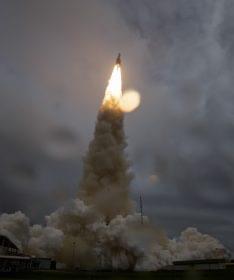After a successful launch of NASA’s James Webb Space Telescope Dec. 25, and completion of two mid-course correction maneuvers, the Webb team has analyzed its initial trajectory and determined the observatory should have enough propellant to allow support of science operations in orbit for significantly more than a 10-year science lifetime. (The minimum baseline for the mission is five years.)
The analysis shows that less propellant than originally planned for is needed to correct Webb’s trajectory toward its final orbit around the second Lagrange point known as L2, a point of gravitational balance on the far side of Earth away from the Sun. Consequently, Webb will have much more than the baseline estimate of propellant – though many factors could ultimately affect Webb’s duration of operation.
Webb has rocket propellant onboard not only for midcourse correction and insertion into orbit around L2, but also for necessary functions during the life of the mission, including “station keeping” maneuvers – small thruster burns to adjust Webb’s orbit — as well as what’s known as momentum management, which maintains Webb’s orientation in space.
